E-commerce is a booming industry that allows entrepreneurs to sell their products and services online. However, not all e-commerce platforms are created equal. Some offer more features, flexibility, and scalability than others. In this post, we will compare and contrast some of the best e-commerce platforms in 2024:
Nexcess
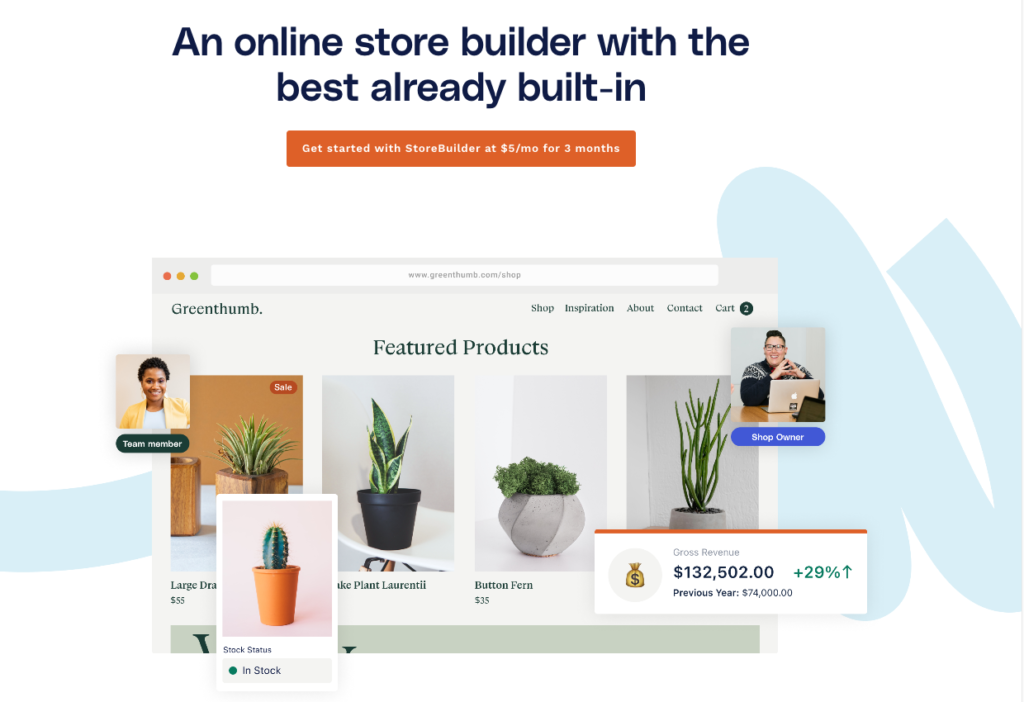
Nexcess is a leading provider of web hosting and e-commerce solutions for online businesses. In this post, we will review their e-commerce platform, which is designed to help you launch and grow your online store with ease and efficiency. We will cover the key features, pros and cons, plans and pricing, and overall conclusion of Nexcess e-commerce platform.
Nexcess e-commerce platform offers a range of features to help you create and manage your online store:
Key Features
- StoreBuilder: This is a tool that helps you build your ecommerce site in minutes, without any coding or design skills. You just answer a few questions about your business and StoreBuilder will create a customized and optimized site for you.
- Auto Scaling: This is a feature that automatically adjusts your server resources based on your traffic and sales volume. You don’t have to worry about downtime or slow performance during peak periods or promotions.
- Managed Magento: This is a service that enhances your Magento site with advanced caching, security, and performance features. You also get access to exclusive Magento extensions, themes, and tools, as well as dedicated support and consulting from Nexcess team.
- Cloud Accelerator: This is a feature that boosts your site speed and performance by leveraging the power of cloud computing. You can choose from various cloud providers, such as AWS, Google Cloud, or Microsoft Azure, and enjoy faster loading times and better user experience.
+
Pros:
- Easy to use and set up, thanks to StoreBuilder and the intuitive dashboard
- Scalable and flexible, thanks to auto scaling and cloud accelerator features
- Compatible with popular ecommerce platforms, such as WooCommerce and Magento, and offers managed services for them
- Secure and reliable, thanks to daily backups, SSL certificates, malware scanning, firewall protection, and 24/7 monitoring
- Excellent customer support and service, with phone, chat, email, ticket, and knowledge base options.
–
Cons:
- More expensive than some of its competitors, especially for higher-tier plans
- Limited customization options for StoreBuilder sites, such as themes and layouts
- Does not offer a free trial or a money-back guarantee for its services.
Plans and Pricing
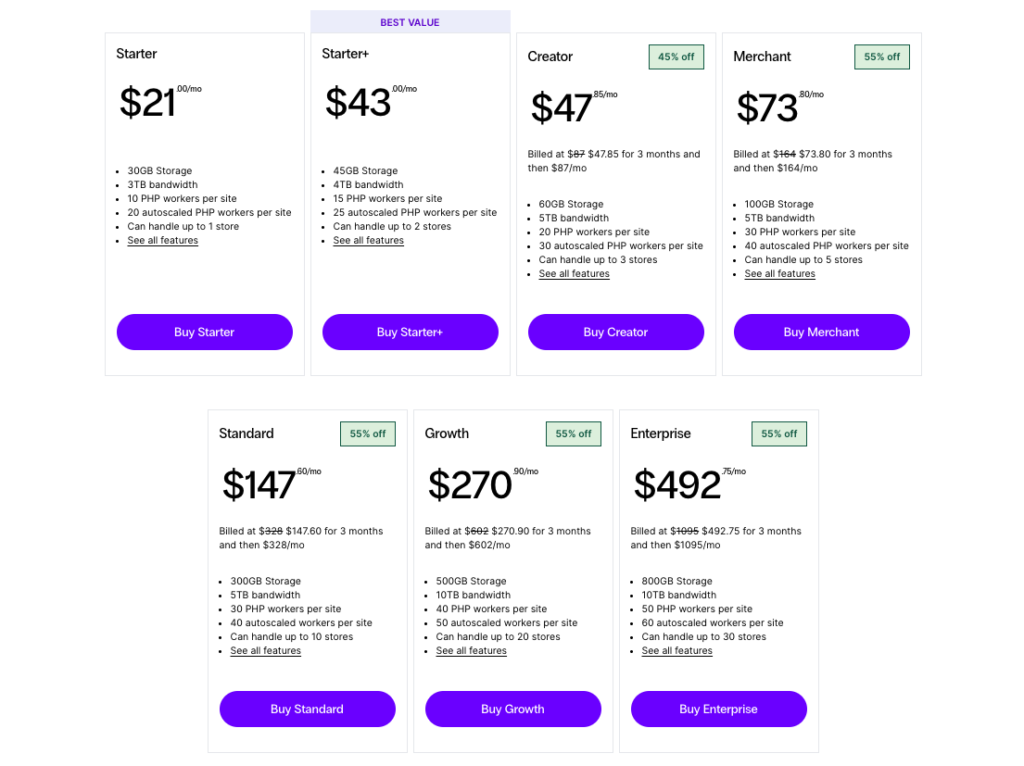
Nexcess e-commerce platform has different plans and pricing options depending on the type of e-commerce platform you choose. Here are the current plans and prices for WooCommerce and Magento:
Woocommerce:
- – Starter: $21 per month for 1 store, 30 GB storage, 3 TB bandwidth
– Starter+: $43 per month for 2 stores, 45 GB storage, 4 TB bandwidth
– Creator: $47 for 3 months/ then $87 per month for 3 stores, 60 GB storage, 5 TB bandwidth
– Merchant: $73 for 3 months/ then $164 per month for 5 stores, 100 GB storage, 5 TB bandwidth
– Standard: $147 for 3 months/ then $328 per month for 10 stores, 300 GB storage, 5 TB bandwidth
– Growth: $270 for 3 months/ then $602 per month for 20 stores, 500 GB storage, 10 TB bandwidth
– Enterprise: $492 for 3 months/ then $1095 per month for 30 stores, 800 GB storage, 10 TB bandwidth
Magento:
- – XS: $37 for 3 months/ then $62 per month for 11 sites, 50 GB storage
– S: $68 for 3 months/ then $114 per month for 16 sites, 75 GB storage
– M: $116 for 3 months/ then $194 per month for 21 sites, 125 GB storage
– L: $195 for 3 months/ then $325 per month 31 sites, 400 GB storage
– XL: $352 for 3 months/ then $588 per month 41 sites, 600 GB storage
– XXL: $542 for 3 months/ then $904 per month 51 sites, 800 GB storage
Overall Conclusion
Nexcess e-commerce platform is a great choice for online businesses that want a fast, secure, scalable, and easy-to-use solution for their e-commerce sites. It offers a variety of features and services to suit different needs and budgets. It also supports popular e-commerce platforms like WooCommerce and Magento. However, it also has some drawbacks that may deter some customers from choosing it. It is more expensive than some of its competitors. It has limited customization options for StoreBuilder sites. It does not offer a free trial or a money-back guarantee. Therefore, you should weigh the pros and cons carefully before deciding if Nexcess ecommerce platform is right for you.
Shopify
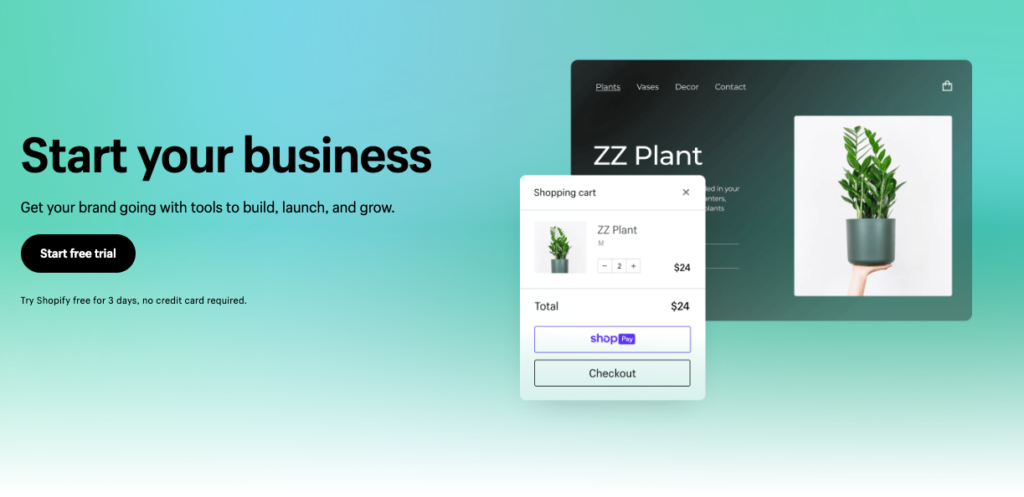
Shopify is surely one of the most popular and widely used e-commerce platforms in the world. It allows anyone to create and run an online store with ease and efficiency:
Key Features
- Themes and templates to customize your store’s appearance and functionality. You can also use the Shopify app store to add more features and integrations to your store.
- Secure and reliable hosting service for your store, with unlimited bandwidth and storage. You also get a free SSL certificate and a custom domain name for your store.
- Multiple payment methods, including credit cards, PayPal, Apple Pay, Google Pay, and more. You can also accept payments in different currencies and languages, and set up taxes and shipping rates accordingly.
- Powerful dashboard and analytics tool that lets you monitor and manage your store’s performance, sales, inventory, customers, marketing, and more. You can also use Shopify’s built-in SEO and marketing tools to optimize your store’s visibility and reach more customers.
- Dedicated customer support team that is available 24/7 via phone, email, chat, or social media. You can also access a wealth of resources and tutorials on the Shopify website and community forums.
+
Pros:
- Scalable and flexible, allowing you to grow your store as your business grows. You can also switch between different plans and features as per your needs
- Easy to use and set up, even for beginners. You don’t need any coding or design skills to create a professional-looking store
- Compatible with many third-party apps and services that can enhance your store’s functionality and performance. You can also integrate your store with other platforms like Facebook, Instagram, Amazon, eBay, etc.
- Offers a 14-day free trial that lets you test out the platform before committing to a plan
–
Cons:
- Charges transaction fees for every sale you make on your store, unless you use Shopify Payments as your payment gateway. This can add up to your costs over time
- Limited customization options for some aspects of your store, such as the checkout page or the URL structure. You may need to hire a developer or use an app to make more changes to your store.
- Plans and pricing can be expensive for some users, especially if you need more advanced features or apps for your store.
Plans and Pricing
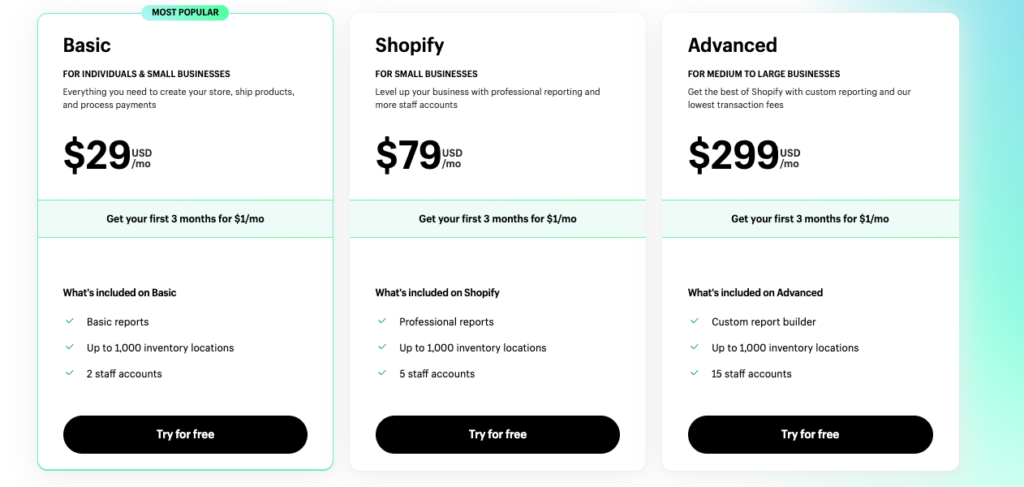
Shopify offers four main plans for its users:
- Basic Shopify plan ($29/month annually billed)
- Shopify plan: ($79/month annually billed)
- Advanced Shopify plan: ($299/month annually billed)
- Shopify Plus plan: (Starting at $2,000 USD/month):
- – Each plan comes with different features and benefits, such as:
- – Number of products and staff accounts you can have on your store
- – Amount of storage space and bandwidth you can use for your store
- – Access to professional reports and analytics tools
- – Access to advanced features like gift cards, discount codes, abandoned cart recovery, etc.
- – Transaction fees charged by Shopify for each sale
- – Access to priority customer support
Shopify is a powerful and user-friendly e-commerce platform that can help you create and run a successful online store. It has many features and benefits that can suit different types of businesses and customers. However, it also has some drawbacks that you should consider before choosing it as your e-commerce solution. Ultimately, the best way to decide if Shopify is right for you is to try it out yourself and see how it works for you.
Ecwid

Ecwid is a cloud-based e-commerce platform that allows you to create and manage an online store on any website, social media platform, or marketplace. It is designed to be easy to use, flexible, and scalable for small and medium-sized businesses.
Key Features
- Drag-and-drop store builder that lets you customize your store’s layout, design, and functionality without coding.
- Wide Integration with over 50 payment gateways, including PayPal, Stripe, Square, and Apple Pay. It also supports multiple currencies and languages, as well as tax and shipping calculations.
- Sell on multiple channels, such as Facebook, Instagram, Amazon, eBay, Google Shopping, and more. You can manage all your orders and inventory from one dashboard.
- Marketing tools to help you promote your store and increase conversions. These include SEO optimization, email marketing, coupons and discounts, abandoned cart recovery, product reviews, and loyalty programs.
- Inventory management system that syncs your products across all your sales channels and notifies you of low stock levels and orders.
- Analytics dashboard that tracks your store’s performance and provides insights into your sales, traffic, conversion rates, and customer behavior.
- Mobile app that lets you manage your store on the go. You can also create a mobile-friendly store that adapts to any device and screen size.
+
Pros:
- Easy to set up and use. You can create a store in minutes and embed it on any website with a few clicks
- Affordable and transparent. It has a free plan that lets you sell up to 10 products and access basic features. The paid plans start from $15 per month and offer more advanced features and unlimited products. There are no transaction fees or hidden costs
- Secure and reliable. It uses SSL encryption to protect your data and transactions. It also has a 99.9% uptime guarantee and 24/7 customer support
–
Cons:
- Some limitations in terms of customization and functionality. For example, you cannot edit the HTML or CSS code of your store or access the API. You also cannot create custom product options or variations
- May not be suitable for large or complex stores that require more control and flexibility. For example, you cannot create multiple stores under one account or manage different user roles and permissions
- May not integrate with some third-party apps or services that you need for your store. For example, you cannot use Shopify apps or WooCommerce plugins with Ecwid
Plans and Pricing
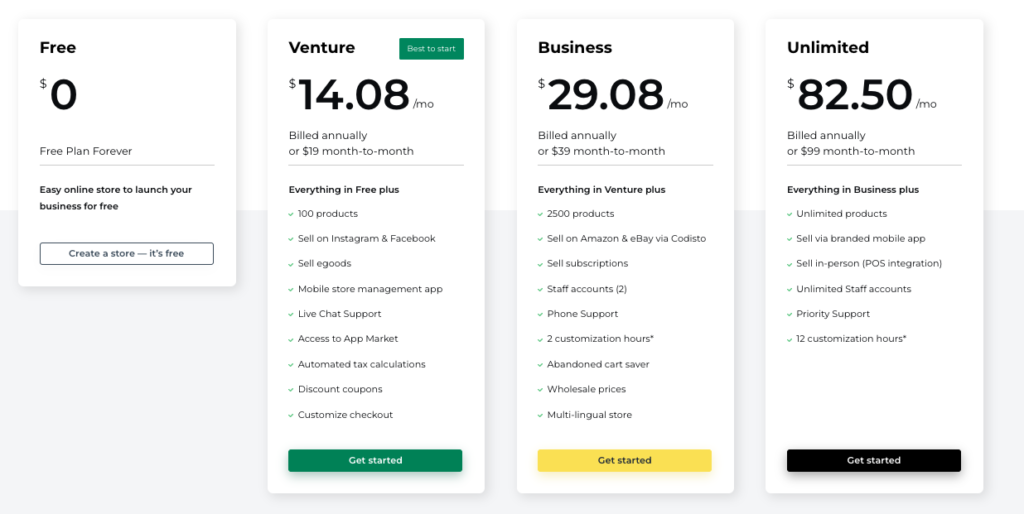
Ecwid has four plans to choose from:
- Free plan($0/month billed annually)
- Venture plan ($15/month billed annually)
- Business plan($29/month billed annually)
- Unlimited plan ($82.5/month billed annually)
All plans include the following features:
- Drag-and-drop store builder
- Mobile app and responsive storefront
- Multiple payment options
- Automatic tax and shipping calculation
- Marketing tools
- Inventory management
- Analytics dashboard
- SSL security
- 24/7 customer support
The higher plans also include the following features:
- Custom domain name
- Product variations
- Digital products
- Product filters
- Abandoned cart recovery
- Wholesale pricing
- Priority support
Overall Conclusion
Ecwid is a great option for anyone who wants to start or grow an online business without hassle or high costs. It offers a user-friendly interface, a wide range of features, and a flexible integration with various platforms. However, it also has some drawbacks that may affect your store’s customization, functionality, or performance. Therefore, you should weigh the pros and cons carefully before choosing Ecwid as your e-commerce platform.
BigCommerce
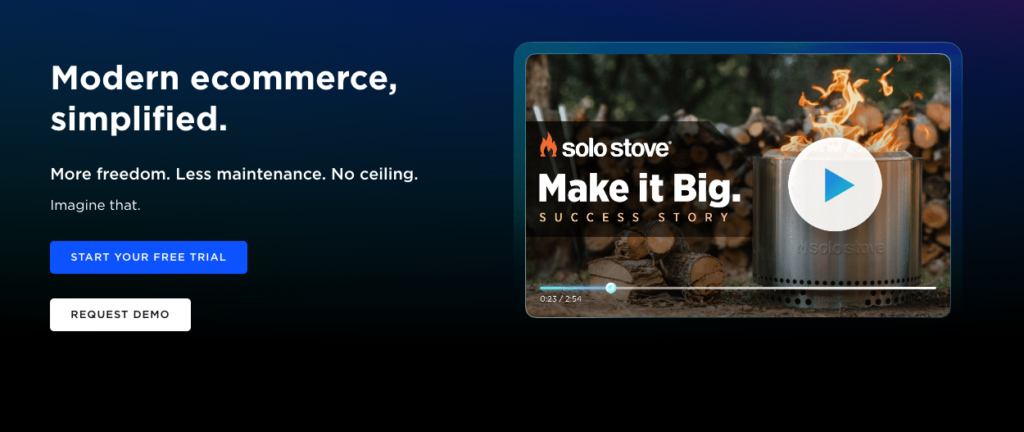
BigCommerce is a leading e-commerce platform, powering over 60,000 online stores worldwide. The platform offers a comprehensive set of features for online merchants:
Key Features
- Drag-and-drop website builder that allows you to create and customize your store without coding.
- Range of themes and templates that are responsive, SEO-friendly, and optimized for conversions.
- Powerful product catalog management system that supports unlimited products, variants, options, categories, and filters.
- Flexible checkout system that supports multiple payment gateways, currencies, languages, and tax rates.
- Robust order management system that integrates with popular shipping carriers, inventory systems, and fulfillment services.
- Built-in marketing suite that includes tools for email marketing, SEO, social media, coupons, discounts, loyalty programs, and more.
- comprehensive analytics dashboard that provides insights into your store’s performance, traffic, sales, customers, and more.
- Dedicated app store that offers hundreds of integrations with third-party services and tools for various functions and features.
+
Pros:
- Cloud-based platform that provides high security, reliability, scalability, and speed for your store.
- Fully hosted platform that takes care of the technical aspects of running your store, such as hosting, maintenance, updates, backups, and SSL certificates
- User-friendly platform that offers a simple and intuitive interface for managing your store and products
- Flexible platform that allows you to customize your store’s design and functionality with code or apps
- Feature-rich platform that offers everything you need to start and grow your online business
–
Cons:
- Relatively expensive platform that charges higher fees than some of its competitors
- Closed-source platform that limits your control over the core code and functionality of your store
- Complex platform that may require some technical skills or assistance to set up and optimize your store.
- May not suit every type of business or industry due to its specific features and limitations.
Plans and Pricing
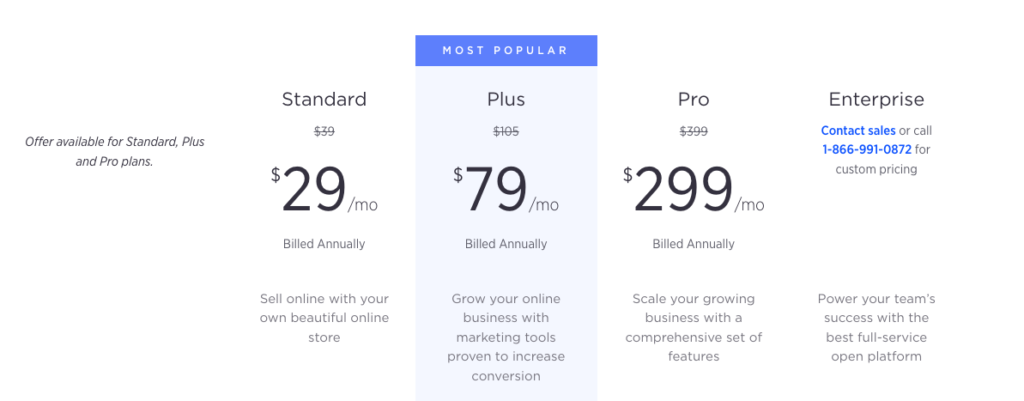
BigCommerce offers four plans for online merchants:
- Standard plan: ($29/month)
- Plus plan: ($79/month)
- Pro plan: ($299/month)
- Enterprise plan (custom pricing)
Each plan comes with different features and benefits depending on your store’s size and needs. Some of the main differences between the plans are:
- The number of staff accounts you can create for your store (from 2 to unlimited).
- The amount of storage space you can use for your store (from 1 GB to unlimited).
- The number of API calls you can make per hour (from 20K to 400K).
- The availability of advanced features such as abandoned cart recovery, customer groups and segmentation, faceted search, Google customer reviews, custom SSL certificates, etc.
Additionally, BigCommerce charges a transaction fee of 0% on all plans except Enterprise. However, it also imposes an annual sales threshold on each plan (from $50K to $400K), which means you have to upgrade your plan if you exceed the limit.
Overall Conclusion
BigCommerce is a powerful and reliable e-commerce platform that offers a lot of features and benefits for online merchants. However, it also has some drawbacks and limitations that may not suit every business or budget. Therefore, it is important to evaluate your needs and goals before choosing BigCommerce as your e-commerce solution. You can also try BigCommerce for free for 15 days to see if it meets your expectations.
Hostinger
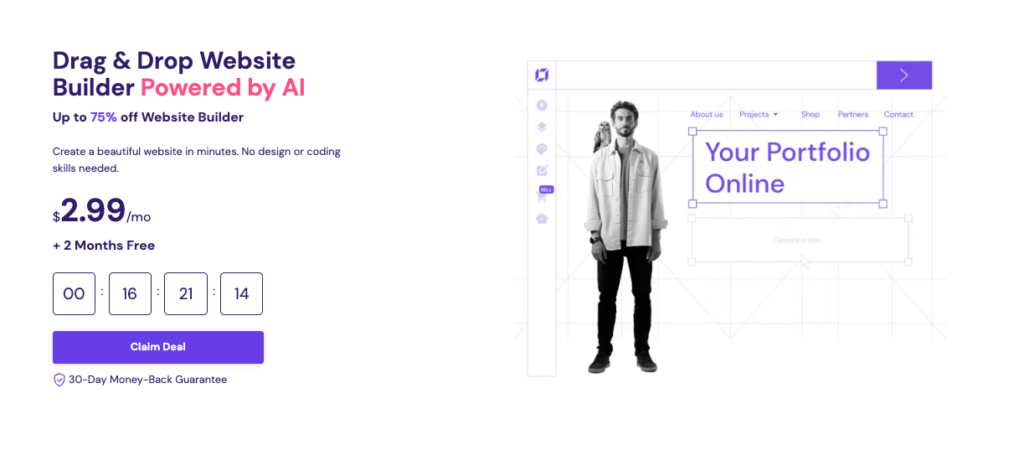
If you are looking for a reliable and affordable platform to start or grow your online store, you might want to consider Hostinger E-commerce. Hostinger is one of the leading web hosting providers in the world, and in 2023, they launched their own e-commerce solution that integrates seamlessly with their hosting plan
Hostinger E-commerce is a fully hosted platform that lets you create and manage your online store without any coding or technical skills. You can choose from hundreds of professional and mobile-friendly templates, customize them with your own logo, colors, fonts, and images, and add your products and categories with ease. You can also use the drag-and-drop builder to create landing pages, product pages, and checkout pages that suit your brand and style.
Hostinger E-commerce also comes with a range of features that help you sell more and grow your business:
Key Features
- Powerful dashboard that gives you an overview of your sales, orders, inventory, customers, and marketing campaigns.
- Built-in SEO tool that helps you optimize your store for search engines and rank higher on Google.
- Marketing suite that includes email marketing, social media integration, coupons, discounts, upsells, cross-sells, and more.
- Secure payment gateway that supports multiple currencies and payment methods, including PayPal, Stripe, credit cards, and more.
- Shipping calculator that automatically calculates the best shipping rates and options for your customers based on their location and preferences.
- Tax calculator that automatically applies the correct tax rates and rules for your customers based on their location and preferences.
- Live chat tool that lets you communicate with your customers in real time and answer their questions and concerns.
- Customer loyalty program that rewards your customers for repeat purchases and referrals.
- Multilingual feature that lets you translate your store into multiple languages and reach a global audience.
+
Pros:
- Very affordable compared to other platforms. You can get started for as low as $1.99 per month for the Starter plan, which includes hosting for one website, 10 GB of disk space, 100 GB of bandwidth, a free SSL certificate, a free domain name for one year, and unlimited products. The other plans are also reasonably priced and offer more features and resources
- Easy to use and set up. You can create your store in minutes with the help of the intuitive interface and the helpful tutorials and guides. You don’t need any coding or technical skills to run your store
- Fast and reliable. Hostinger uses cloud-based servers that are optimized for speed and performance. Your store will load quickly and smoothly on any device and browser. Hostinger also offers a 99.9% uptime guarantee and 24/7 customer support.
–
Cons:
- Relatively new in the market and may not have all the features and integrations that some other platforms have. For example, Hostinger E-commerce does not support dropshipping or multi-vendor marketplaces. You may also need to use third-party apps or plugins to add some functionality to your store.
- Not very flexible or customizable. You can only use the templates and themes that Hostinger provides, which may not suit your specific needs or preferences. You also have limited control over the design and layout of your store. You cannot access or modify the code or the backend of your store.
Plans and Pricing

Hostinger E-commerce offers four plans to choose from: Starter, Premium, Business, and Enterprise:
- Single: $1.99 per month
- Hosting for one website
- 50 GB of disk space
- 100 GB of bandwidth
- Free SSL certificate
- Free domain name for one year
- Unlimited products
- SEO tool
- Marketing suite
- Payment gateway
- Shipping calculator
- Tax calculator
- Live chat tool
- Premium: $2.99 per month
- Everything in Starter plus:
- Hosting for 100 websites
- 100 GB disk space
- Unlimited bandwidth
- Free CDN (content delivery network)
- Customer loyalty program
- Multilingual feature
- Business: $3.99 per month
- Everything in Premium plus:
- 200 GB disk space
- Daily backups
- Priority support
- Custom domain email accounts
- Cloud: $9.99 per month
- Everything in Business plus:
- Hosting for 300 websites
- 200 GB disk space
- Dedicated account manager
- Custom solutions and integrations
- Advanced security and performance
Overall Conclusion
Hostinger E-commerce is a great option for anyone who wants to start or grow their online store without breaking the bank. It offers a lot of features and benefits for a low price, and it is very easy to use and manage. However, it may not be the best choice for those who need more flexibility, customization, or functionality for their store. You may want to compare Hostinger E-commerce with other platforms before making your final decision.
Square Online
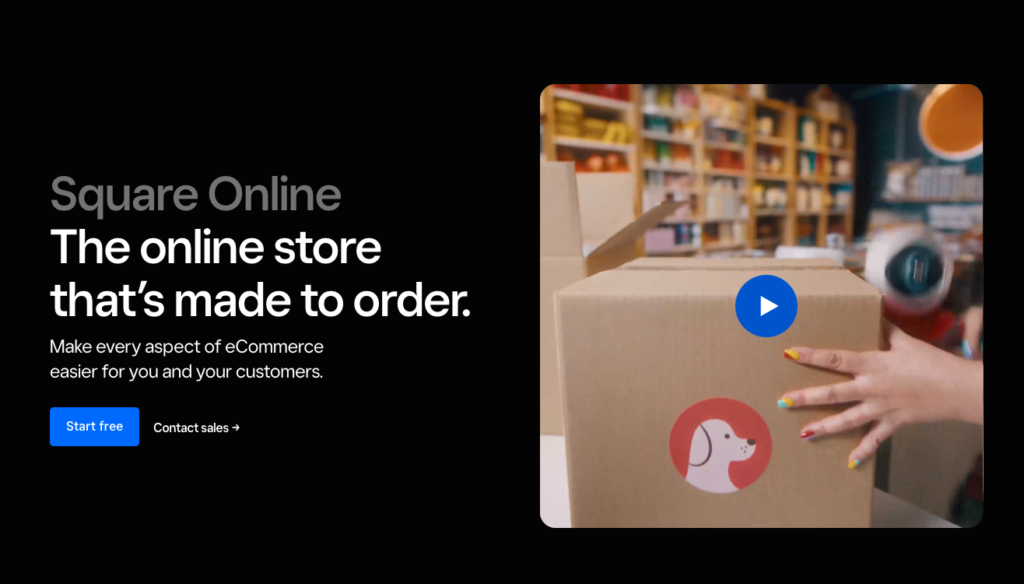
Square Online is a platform that allows you to create and manage your own online store, without any coding or design skills. It is powered by Square, a company that provides payment processing and other business tools for small and medium-sized businesses.
Key Features
- Variety of templates and themes to choose from, or you can start from scratch and customize your site with drag-and-drop tools.
- Sell physical and digital products, services, subscriptions, donations, and more. You can also integrate with third-party apps and platforms, such as Instagram, Facebook, Google Shopping, Mailchimp, etc.
- Accept payments online with Square or other payment gateways, such as PayPal, Stripe, etc. You can also offer local pickup and delivery options, as well as shipping labels and tracking.
- Manage your inventory, orders, customers, marketing, analytics, and more from one dashboard. You can also sync your online and offline sales with Square POS.
- Access 24/7 customer support via phone, email, or chat. You can also access a community forum and a help center with articles and videos.
+
Pros:
- Easy to use and set up. You can launch your online store in minutes, without any technical skills or coding
- Affordable and transparent. You can start for free and pay only when you make a sale. There are no hidden fees or long-term contracts
- Flexible and scalable. You can sell anything you want, anywhere you want. You can also grow your business with advanced features and integrations
–
Cons:
- Limited in customization and functionality. You may not be able to achieve the exact look and feel you want for your site. You may also encounter some limitations in terms of features and integrations
- Dependent on Square. If you want to use Square Online, you have to use Square as your payment processor. This may not be ideal for some businesses or customers who prefer other options
- Competitive and crowded. You may face a lot of competition from other online sellers who use the same platform. You may also have to deal with some issues such as downtime or glitches
Plans and Pricing
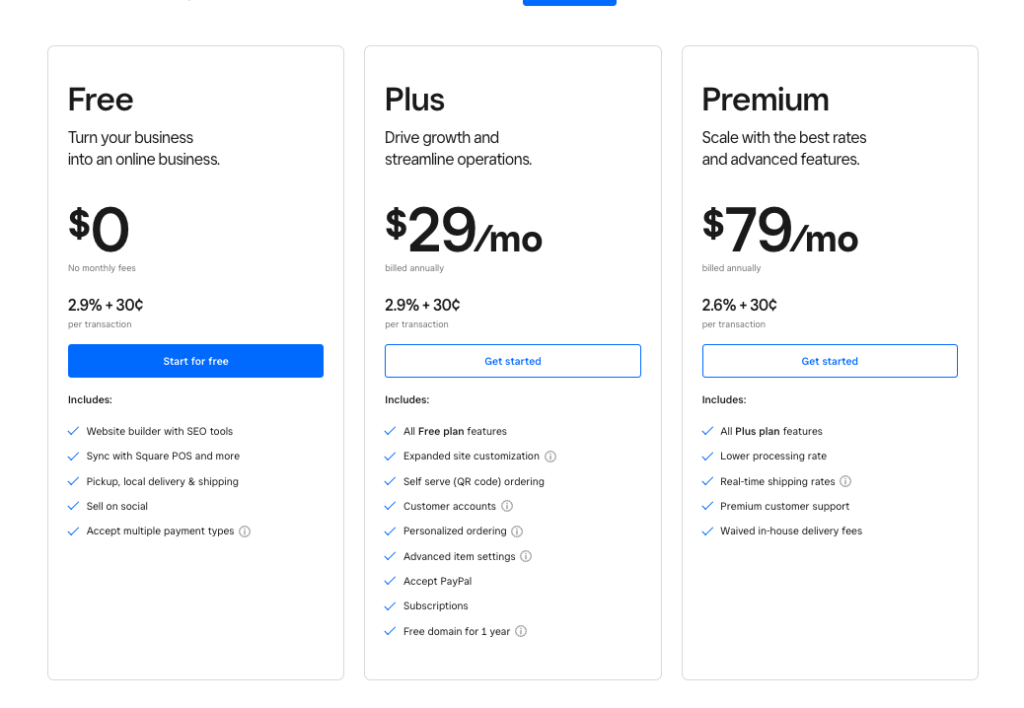
Square Online has three plans to choose from:
- Free plan: $0 per month + 2.9% + 30¢ per transaction. This plan includes unlimited products, free SSL certificate, SEO tools, inventory management, order management, coupons, gift cards, etc.
- Pluse plan: $29 per month + 2.9% + 30¢ per transaction. This plan includes everything in the Free plan plus customer accounts, advanced shipping options, discounts on shipping labels, Facebook ads integration, etc.
- Premium plan: $79 per month + 2.6% + 30¢ per transaction. This plan includes everything in the Plus plan plus lower transaction fees, priority phone support, real-time shipping rates from major carriers, etc.
All plans include unlimited products, SSL security, SEO tools, inventory management,
Overall Conclusion
Square Online is a great option for anyone who wants to start or grow their online business quickly and easily. It offers a lot of features and benefits for a reasonable price. However, it may not be the best choice for everyone who wants more control and customization over their site. It may also not be the most reliable or secure platform in the market. Therefore, it is important to weigh the pros and cons before deciding if Square Online is right for you.
Squarespace

Squarespace is one of the most popular platforms for creating and managing online stores. But how does it compare to other e-commerce solutions?
Squarespace E-commerce offers a range of features to help you create a beautiful and functional online store. Some of the main features are:
Key Features
- Drag-and-drop website builder with hundreds of templates and customization options.
- Integrated shopping cart and checkout system with secure payment processing.
- Inventory management and order fulfillment tools
- Marketing and analytics tools to help you grow your audience and sales
- Customer accounts and loyalty programs
- Integration with third-party apps and services such as Mailchimp, Stripe, PayPal, Shopify, etc.
+
Pros:
- Easy to use and set up, no coding required
- Beautiful and responsive design that works on any device
- All-in-one solution that includes hosting, domain, SSL certificate, etc
- Reliable and fast performance with 99.98% uptime
- 24/7 customer support via email, live chat and phone
–
Cons:
- Limited customization and flexibility compared to other platforms
- Higher price than some competitors
- Transaction fees for some plans
- No native support for digital products or subscriptions
Plans and Pricing
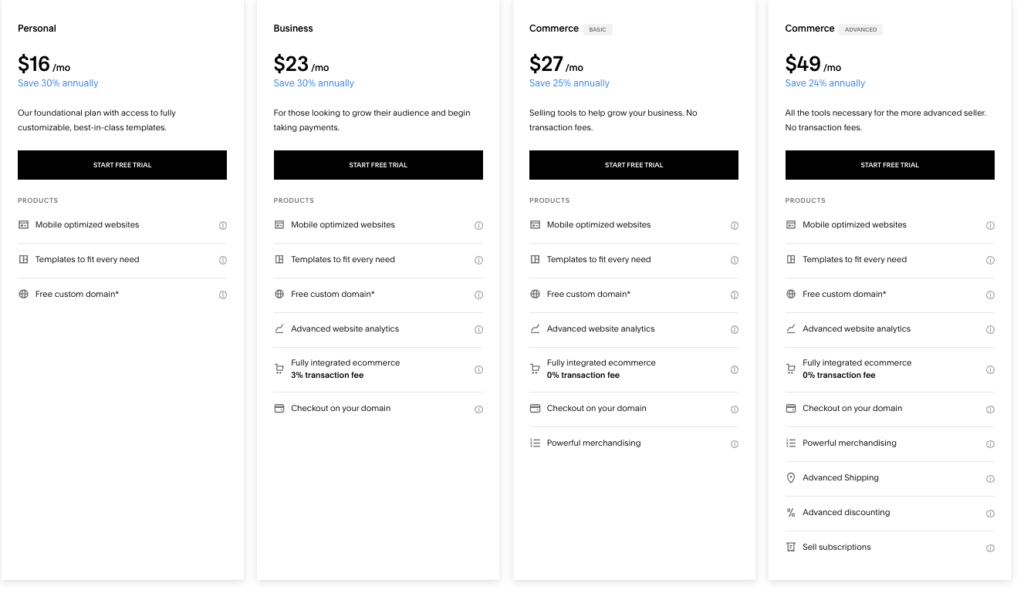
Squarespace E-commerce has four plans to choose from, depending on your needs and budget:
- Personal plan:$16/month or $192/year. This plan is suitable for small websites or blogs that want to sell a few products. It includes unlimited storage and bandwidth, free custom domain, SSL security, SEO tools, basic website metrics, mobile optimization and 3% transaction fees.
- Business plan: $23/month or $276/year. This plan is ideal for small businesses that want to sell more products and services. It includes everything in the Personal plan plus professional email from Google Workspace, advanced website analytics, promotional pop-ups and banners, fully integrated e-commerce features, 2% transaction fees and $100 Google Ads credit.
- Basic Commerce plan: $27/month or $324/year. This plan is designed for growing online stores that want more e-commerce tools and capabilities. It includes everything in the Business plan plus customer accounts, checkout on your own domain, powerful e-commerce analytics, inventory, orders, tax and coupons management, label printing via ShipStation and no transaction fees.
- Advanced Commerce plan: $49/month or $588/year. This plan is perfect for large online stores that want the best e-commerce features and performance. It includes everything in the Basic Commerce plan plus abandoned cart recovery, real-time carrier shipping rates, automatic discounts, gift cards, advanced shipping options, APIs for orders and inventory and limited availability labels.
Overall Conclusion
Squarespace E-commerce is a great option for anyone who wants to create a stunning and professional online store without much hassle. It offers a lot of features and benefits that can help you sell your products and services online. However, it also has some limitations and drawbacks that may not suit everyone’s needs and preferences. Therefore, we recommend that you try out the free 14-day trial before committing to a plan. You can also compare Squarespace E-commerce with other e-commerce platforms to see which one works best for you.
How to Choose an E-commerce Platform
If you are planning to start an online business, one of the most important decisions you need to make is choosing an e-commerce platform. An e-commerce platform is a software application that allows you to create, manage and run your online store. There are many factors to consider when choosing an e-commerce platform, such as:
- The features and functionality you need for your products and services
- The cost and scalability of the platform
- The ease of use and customization of the platform
- The security and reliability of the platform
- The customer support and community of the platform
To help you choose the best e-commerce platform for your business, you should do some research and compare different options. You can also read reviews and testimonials from other users, or try out free trials or demos of the platforms. Some of the most popular e-commerce platforms in the market are:
- Shopify: A cloud-based platform that offers a variety of features and templates for different types of businesses. Shopify is easy to set up and use, and has a large app store and a helpful support team.
- WooCommerce: A plugin that turns your WordPress website into an online store. WooCommerce is flexible and customizable, and has a huge community of developers and users. WooCommerce is free to use, but you need to pay for hosting, domain name and extensions.
- Magento: An open-source platform that offers a high level of control and customization for your online store. Magento is powerful and scalable, and has a wide range of features and integrations. Magento is suitable for large and complex businesses, but requires technical skills and resources to maintain.
—–
Disclosure: Please note that we may receive affiliate compensation for some of the links below, at no expense to you, should you decide to purchase a paid plan. This blog does not provide financial advice, it is purely for entertainment and fun.













